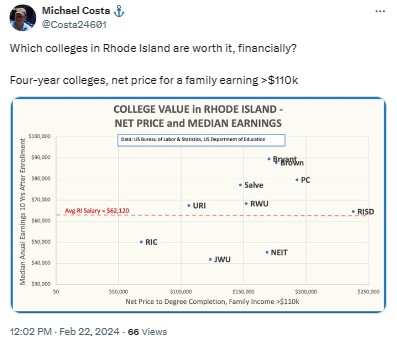These stories come much too quickly to keep up, digest, and consider, but Mel’s review of Letitia James’s campaign finance reports a few weeks ago is worth a look:
What might we find in RI, if we looked?
[Open full post]Letting 17-year-olds vote in primaries if they’ll be eligible to vote in the associated general elections is certainly reasonable, but that doesn’t mean we shouldn’t note a pair of conspicuous questions along the way.
Firstly, why do Democrats seem always to want to expand voting toward the most manipulable constituencies?
Secondly (and perhaps relatedly), why do our beliefs about maturity seem to be moving in contrary directions? Young adults can remain on their parents’ health insurance through the better part of their 20s, and they now typically stay in school nearly as late, where it’s apparently unfair to hold them accountable for the debt they incur. We expect them to take less and less responsibility later and later in life. Yet, the push is on to let them decide they want to mutilate their bodies to “become” the opposite sex at early ages and to let them vote on politicians who affect us all.
It’s almost like the intention is to keep them from growing up, confuse them, and then urge them to give government more power over our lives.
[Open full post]In the last couple decades, Americans (at least those who occupy seats in academia and mainstream media) appear to have lost their ability to distinguish between upholding a principle and supporting any given people who might benefit from that principle from time to time. Nobody likes to defend groups that are broadly deplored, like Nazis and the KKK, but it has become risky to do so, even where the principle is clear.
The latest disfavored group to ricochet through Rhode Island’s media echo chamber is PINE — the People’s Initiative of New England. The group’s purpose is to transform New England into a “White Homeland” that would secede from the United States. Like all such separatist groups (e.g., the black Rise of the Moors group that had an armed standoff with police on 95 a few years ago), the group’s mission is objectionable and kooky. Personally, I suspect I’d be welcomed by none, inasmuch as I’m white, Catholic, conservative, and have had conversations that left me with the impression my Jewish last name was getting a provisional pass based on this or that policy agreement.
Nonetheless, coverage of PINE’s appearance in Cumberland offers some warning signs of its own. Ethan Shorey’s article in The Valley Breeze is an example of the way in which journalists’ ideological poses and disregard for precision can undermine their profession and our ability to understand the world.
Consider the headline: “Supremacist group visits sites in Cumberland.” Strictly speaking, nothing in the literature the group was distributing suggests “supremacy.” That doesn’t mean they aren’t objectionable, but anthropologically, a distinction exists between a subculture that prioritizes its ethnic identity as a foundation for cohesion and health and one that believes its members are superior, implying subjugation and expansion. This is true regardless of the race in question.
Imposing “supremacist” as pejorative when it doesn’t strictly apply obscures understanding of the variety of groups and complicates identification of the causes of their problematic kookiness. If their motivation is retrenchment for social health, that’s not only a signal that they may correctly be identifying a problem (albeit with the wrong solution), but also an opportunity to undermine their divisiveness by addressing those problems in a better way. Transforming them into cartoon villains for the purpose of elite bonding lets grievances fester and invites conflict.
Similarly, Shorey later goes on to report that an “attempt to catch up with members and get them to explain their hatred for non-whites was not successful.” To be sure, the assumption of “hatred” would be fair from a reader of the news, but embedded in a supposed news article this way, it only conveys the reporter’s inability to write a few hundred words objectively. People pick up on such things, and even those who aren’t as extreme as PINE may wonder, when dealing with Shorey, whether he’ll give them a fair hearing. (I certainly wouldn’t expect it, myself.)
If our society is to have any hope of a future, we must renew our consensus about core principles, including among others the importance of clear, logical distinctions and of venues in which people can expect to be considered fairly. Without such principles, we’ll cease to be able to communicate or even coexist.
Featured image by Justin Katz using Dall-E 3 and Photoshop.
[Open full post]This legislation is hardly the most-pressing matter facing Rhode Island at the moment:
Sen. Frank A. Ciccone III and Rep. Enrique George Sanchez are sponsoring legislation to require most businesses in Rhode Island to pay their employees weekly.
Has either of these legislators ever had to make payroll for a business? One suspects they simply don’t understand the challenges of operating a business, so this seems like a no-brain crumb they can throw to the constituents to claim to be helping them.
They would exempt small government offices and nonprofits, which shows they have some dim understanding that the legislation could be harmful, but that’s just a special-interest nod. You otherwise have to conclude that they consider themselves competent to micromanage the entire Ocean State economy and don’t really care what the effects might be.
[Open full post]On WNRI 1380 AM/95.1 FM, John DePetro and Justin Katz discuss:
- An “unlawful presence”
- Biden undoes his Sista Solja moment
- McKee, Ruggerio, and the reality of the Washington Bridge
- Mysterious whale deaths confirmed not to be something nobody thought they were
- Pols’ relationship with WPRI
- Providence’s relationship with unions
Featured image by Justin Katz using Dall-E 3.
[Open full post]Yesterday, I listened to Pearl Jam’s Vitalogy album all the way though for maybe the first time because it’s the 574th best-selling album, and I’m tracing that list from the top. The band’s prior recording, Vs., had been such a disappointment that I didn’t bother with its follow-up.
Vs. came out while I was a freshman at Carnegie Mellon University, so buying it took some doing. I had to decide if the cost was worth the tradeoff on my slim budget, find a music store in an unfamiliar city without the Internet, figure out the bus schedule, and ride back-and-forth across town, observing people along the way.
It feels like we’ve lost something by making everything so easy. Tom Petty once complained that CDs and tapes took something out of the musical experience. Vinyl records came in this large, beautiful envelope, like a poster packaged with the music. CDs and tapes would fit in your pocket.
At least you still had to go to the store and find them. There was an adventure to it, and if you didn’t know what, exactly, you wanted, you had to make an actual decision, because you could only buy so many. And sometimes the experience was all you had, because the album proved a disappointment, like Vs.
Of course, I never could have listened to all the best-selling albums back then. Even knowing what they were would have taken extensive research, and listening to them all would have been a heroic quest.
As in so many areas, what we need is a way to revive the sense of adventure, tangible experience, and risk without imposing a phony scarcity.
[Open full post]This is certainly not where I’d have placed the dots if somebody asked me to guess:
That Rhode Island College is the least expensive, and doesn’t seem to produce a great effect isn’t a surprise. Johnson & Whales, however, is surprising, and New England Institute of Technology is even more so, both in how expensive it is and in the fact that it doesn’t produce even an average income in Rhode Island. I’d have thought skilled trades would achieve that threshold.
[Open full post]On WNRI 1380 AM/95.1 FM, John DePetro and Justin Katz discuss:
- Many lanes of misdirection on the Washington Bridge
- All That distraction from bad governance
- A whodunit of whale deaths
- Curious claims about pale Others
- The unspoken source of schools’ lone increasing subgroup
- A forgotten precedent for McKee’s APRA overcharging
Featured image by Justin Katz using Dall-E 3 and Photoshop AI.
[Open full post]The focus of the related article is explaining why the American Northwest was unique in the country in its increase in emissions from 2022 to 2023, but Rhode Island is a conspicuous red dot on Michael Thomas’s map:
If accurate, this result shows “net zero” proclamations to be so much hot air, but what happened? I’m only speculating, here, but I wonder if the result comes from our deteriorating infrastructure and punishing economic policy. If infrastructure is inadequate, people will do things like run gas generators when the power goes out, and when businesses and households are struggling to make ends meet, they’re not going to invest in newer technologies, which will tend to be more efficient.
[Open full post]Honestly, it looks like Lomborg has identified a typical example of the method of operations for alarmists with this tweet:
As with economic numbers, environmental alarmism creates too much incentive of money and power for the numbers to be trusted.
[Open full post]








